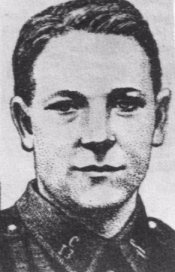 When I was a child I thought my Uncle Paul served in the Little Bay army. It was a belief that got a few chuckles from the adults around me. Since I’ve started uncovering Little Bay’s history I’ve found the concept of the Little Bay army to feel a little closer to truth. Little Bay can claim a proud military history with recognized veterans of both world wars. A more recent conflict claimed my cousin and dear friend Stephen Bouzane. We lost him in Afghanistan in 2006. My research on Little Bay focuses a little earlier in time. I focus on the last decades of the 19th century. Those years in Little Bay saw the births of several wartime heroes. Last Remembrance Day I told you about Mayo Lind. This year I will introduce you to another of Little Bay’s lost sons. This is the story of John Bernard Croak who was known to his friends as Jack.
When I was a child I thought my Uncle Paul served in the Little Bay army. It was a belief that got a few chuckles from the adults around me. Since I’ve started uncovering Little Bay’s history I’ve found the concept of the Little Bay army to feel a little closer to truth. Little Bay can claim a proud military history with recognized veterans of both world wars. A more recent conflict claimed my cousin and dear friend Stephen Bouzane. We lost him in Afghanistan in 2006. My research on Little Bay focuses a little earlier in time. I focus on the last decades of the 19th century. Those years in Little Bay saw the births of several wartime heroes. Last Remembrance Day I told you about Mayo Lind. This year I will introduce you to another of Little Bay’s lost sons. This is the story of John Bernard Croak who was known to his friends as Jack.
Jack Croak was the first Newfoundlander to receive the Victoria Cross. He is perhaps better claimed by Nova Scotia than Newfoundland but Newfoundland is reluctant to let go of its own and so, to us, he remains a Newfoundlander. His time on the island was brief. He was born in Little Bay in 1892. His family left the island just four years later in 1896.
Private Croak is well and deservedly celebrated in Nova Scotia. There is a school named for him in Glace Bay – John Bernard Croak Victoria Cross Memorial School. Early media reports on Private Croak failed to recognize him as a Newfoundlander. In fact, while researching him for this piece I found many entries on genealogy websites that placed his birth in Glace Bay. I was worried that we might have gotten his Newfoundland status wrong, especially after seeing Glace Bay listed as his place of birth in official military files. Census lists in Nova Scotia and his baptism in Badger cleared up his early heritage and so we can continue to claim him as our own. Jack Croak connects Little Bay and Glace Bay but if you’ve been following my work you know that migrating workers entangle the history of the two mining towns. The Croak family was part of a larger exodus of Little Bay miners to transport to Glace Bay, Nova Scotia during the 1890s.
I can’t say for certain when Jack’s parents arrived in Little Bay. My earliest reference to his father, James Croak, places him in town by 1889. James appears on the Voter’s List there that year. His absence from the Voter’s List in 1882 indicates an arrival sometime between those dates. Newspaper references place the family’s origin as either Grand Bank or Placentia. The year after Jack’s birth in 1893 there were signs of upcoming trouble for mining in Little Bay and at the same time the mine in Glace Bay started to really take off. 1894 saw the Little Bay mine suffer a major shutdown. Employment was hit and miss after that as operations would start up again only to be slowed in repetition. Most of the population held on expecting things to improve but a sizeable minority saw the signs of worst things to come.
James Croak continued to work as a miner in Glace Bay after migrating there in 1896. His son Jack would follow his footsteps underground. As such Jack Croak was working as a labourer when he enlisted for Canadian military service in 1915. Three years later his life would end in the service of his country. He died in France on the 8th of August in 1918. His actions on his final day are the stuff of legend. They are well and better documented in other sources such as those I’ve listed at the bottom of this article where they are described in greater detail and done more justice than I can replicate here, nevertheless I will give you a summery of Jack Croak’s actions on that day.
August 8th was the first day of a prolonged offensive known as the Battle of Amiens which opened the Hundred Days Offensive which subsequently ended the First World War. Allied forces covered more than 11 kilometres that day, overwhelming the German troops, many of which surrendered. In the confusion of the battle Jack Croak became separated from his platoon. Alone among that smoke and carnage he located an enemy machine gun nest. Alone he attacked it, bombing the gun nest and single handedly capturing it. His right arm was injured but he did not stop there. Injured and alone he continued on until he rejoined his platoon. At this point he charged ahead of them toward the next enemy trench and so lead his men in taking three more enemy machine guns and capturing an entire German garrison. Private Croak was injured again during that assault and died from his wounds during the battle. His actions on that day were witnessed with awe.
On September 27th that year nine men were awarded the Victoria Cross for actions they’d taken on August 8th. John Croak was among them, he was one of four who were posthumously recognized. The Victoria Cross is no small recognition. Joy B. Cave’s book “Two Newfoundland V.C.s” (1984) outlines the service and sacrifice of John B. Croak and Thomas R. Ricketts. In it she writes this of the Victoria Cross – it “is not lightly awarded. Any man who wears this medal has indubitably performed some action which can truly be described as extraordinarily courageous, over and above the normal call of duty” (P. 90). Private John Bernard Croak known to his friends as Jack, certainly fits the bill. He was a proud son of both Newfoundland and Nova Scotia. Thank you, Jack, for your sacrifice and service. Thank you to all who serve. And thank you for reading.
Sources:
- The London Gazette, Sept 24, 1918
- St. John’s Evening Advocate, Sept 28 1918
- St. John’s Evening Telegram, Dec 20, 1919
- St. John’s Daily Star, Jan 17, 1921
- The Newfoundland Times, Sept 6, 1941
- Twillingate Sun, Sept 18, 1948
- Atlantic Guardian, 1948 – “Little Bay’s Two Heroes”
- Two Newfoundland V.C.s (Joy. B. Cave), 1984
